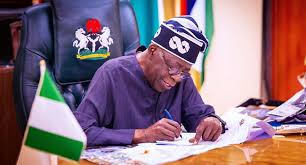President Bola Ahmed Tinubu is expected to sign four major tax reform bills into law on Thursday, June 26, 2025, at the Presidential Villa in Abuja. The signing marks a major step by the Federal Government to modernise Nigeria’s tax system, improve business operations, increase revenue generation, and promote economic stability across the country.
The announcement was made by the President’s Special Adviser on Information and Strategy, Mr. Bayo Onanuga. He said the bills were carefully prepared through consultations with business groups, tax experts, economic stakeholders, and representatives from different regions of the country. According to him, the reform process, led by the Presidential Committee on Fiscal Policy and Tax Reforms chaired by Mr. Taiwo Oyedele, began with the submission of the draft bills to the National Assembly in October 2024. The bills were later passed after public hearings and legislative review.
The four bills to be signed include the Nigeria Tax Bill, Nigeria Tax Administration Bill, Nigeria Revenue Service (Establishment) Bill, and the Joint Revenue Board (Establishment) Bill. Each of these new laws is aimed at addressing specific challenges in Nigeria’s current tax environment and creating a simpler, fairer, and more transparent tax system.
The Nigeria Tax Bill, also referred to as the “Ease of Doing Business Act,” is designed to unify Nigeria’s tax laws and reduce the number of overlapping tax rules across the country. It seeks to cut down the stress faced by business owners when dealing with different taxes at various government levels. The bill also aims to provide a stable tax structure that encourages both local and foreign investors.
The Nigeria Tax Administration Bill is expected to provide a common legal and administrative framework for managing taxes across federal, state, and local governments. This uniform system will help reduce disputes between tax authorities and improve efficiency in tax collection.
Another critical law to be signed is the Nigeria Revenue Service (Establishment) Bill. It will replace the old Federal Inland Revenue Service Act with a new agency called the Nigeria Revenue Service (NRS). This new agency will have a wider responsibility that includes both tax and non-tax revenue collection. It will also have more independence and be required to meet higher accountability and performance standards.
The fourth bill, the Joint Revenue Board (Establishment) Bill, is aimed at promoting better coordination between the different levels of government in Nigeria. It will create a joint board that includes all key tax agencies and introduces the establishment of a Tax Appeal Tribunal and a Tax Ombudsman’s Office to resolve complaints and ensure that taxpayers are treated fairly.
The bill signing ceremony is expected to be attended by top officials including the Senate President, Senator Godswill Akpabio; Speaker of the House of Representatives, Hon. Tajudeen Abbas; Senate and House finance committee chairmen; as well as the Senate and House Majority Leaders. Some state governors are also expected, including Abdulrahman Abdulrazaq, Chairman of the Nigeria Governors’ Forum (NGF), and Governor Hope Uzodinma of Imo State, who leads the Progressives Governors Forum. Also in attendance will be the Minister of Finance and Coordinating Minister of the Economy, Mr. Wale Edun, and the Attorney General of the Federation and Minister of Justice, Mr. Lateef Fagbemi.
While the reforms have received support from many quarters, there were concerns from the Northern Governors’ Forum about proposed changes in the sharing formula for value-added tax (VAT), especially regarding derivation principles. However, these concerns were addressed during consultations and adjustments were made before finalising the bills.
Experts believe the new laws will increase Nigeria’s chances of attracting foreign direct investment, by making the business environment less complex and more predictable. The reforms are also expected to improve revenue collection at all levels of government and reduce reliance on borrowing to fund national and state budgets.
Analysts say that the true impact of the bills will depend on how well they are implemented. The federal and state governments will need to work closely together, while the newly established Nigeria Revenue Service must operate with transparency and efficiency.
This new tax reform is one of the most ambitious attempts in recent years to fix Nigeria’s tax system, boost economic growth, and support development goals. If the laws are applied correctly, they could lay the foundation for a fairer and stronger fiscal system for Nigeria.
